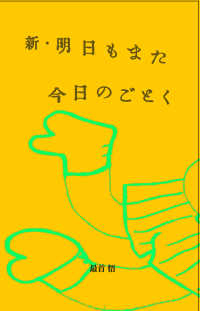- ホーム
- > 洋書
- > 英文書
- > Philosophy
Full Description
This book applies notions from C.S. Peirce's philosophy, such as semiosis, mind, diagrammatic reasoning, abduction, and habits, to contemporary problems in distributed cognitive science. These problems include distributed cognitive systems, cognitive niche construction, external representations, cognitive artifacts, agency, and emergence. In this movement, Peirce's approach provides a philosophical framework that reconceptualizes fundamental notions in distributed cognitive science. Among the founders of pragmatism, Charles S. Peirce remains one of the least influential within the pragmatic turn in cognitive science. Nevertheless, Peirce's theory of mind is processist and externalist, placing it at the center of cognition and the action of external signs. This book is therefore of interest to philosophers of science as well as cognitive scientists and cognitive linguists.
Contents
1 Semiotic turn in distributed cognition.- 2 Active semiotic externalism.- 3 Semiosis as an emergent process.- 4 The emergence of sign action: the case of Classical ballet.- 5 Artifacts in problem solving: iconicity and abductive inference.- 6 The object of iconic artifacts: why an underground system is a semiotic problem.- 7 Poetry improvisation as problem-solving in distributed cognitive systems.- 8 Semiosis as problem-solving, problem-solving as semiosis.- 9 Meaning is niche construction: semiotic artifacts and cognitive externalism.- 10 Artwork authorship as a legisign-in-action.- 11 Towards a typology of artistic experimentation -- metasemiotic experiment as niche construction 'pump'.- 12 Conclusion.- References.

![転生令嬢は腹黒騎士に攻略される[ばら売り] 第26話 花とゆめコミックススペシャル](../images/goods/ar2/web/eimgdata/EK-2148532.jpg)






